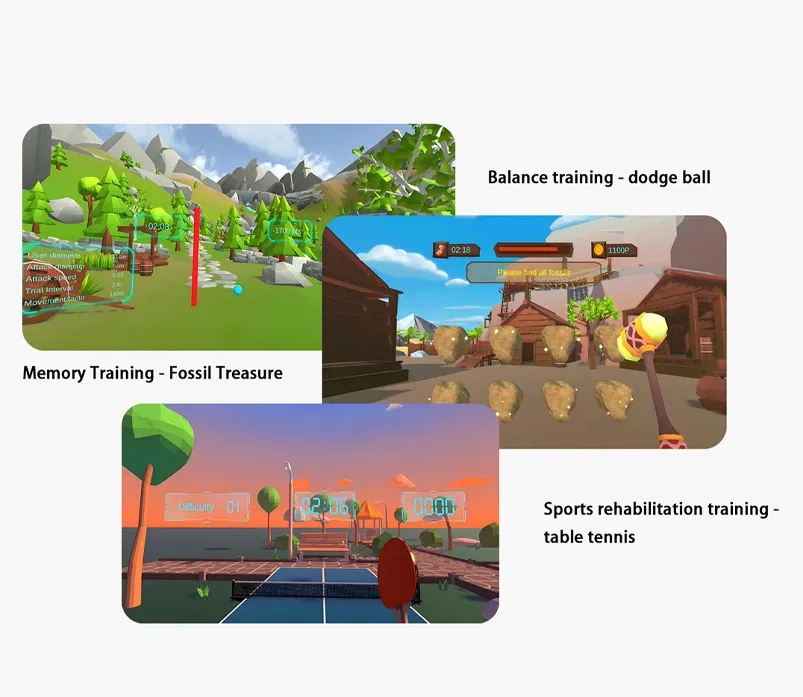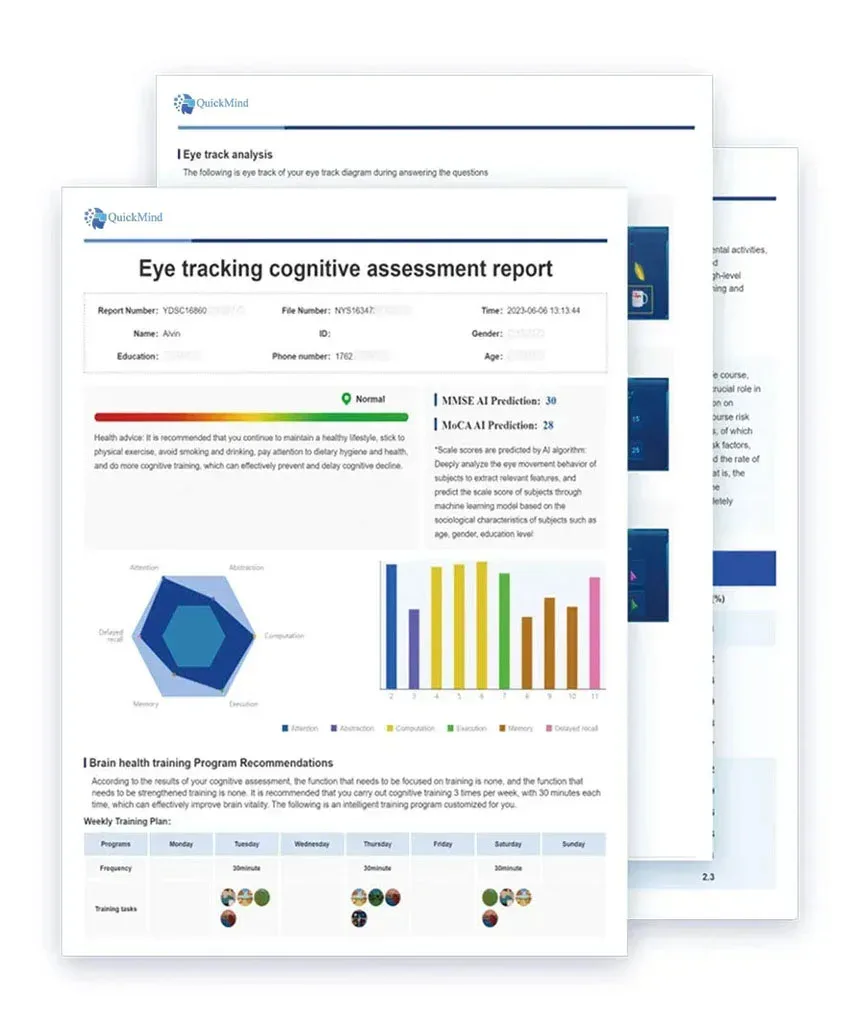
Expanding explorations reveals that VR technology modality can profoundly advance the quality of persons suffering from memory disorders. By conveying them to comforting surroundings, VR presents a novel platform for cognitive stimulation, psychological balance, and collective involvement. Multiple evaluations have revealed that VR therapy can decrease agitation, unease, and low mood in dementia users while also augmenting their cognition, focus, and communication skills.
- VR empowers patients with dementia to revisit treasured recollections through collaborative illustrations.
- In addition, it can offer a securely controlled and helpful space for community involvement, developing a feeling of union and acceptance.
- Scholars consider that VR therapy has the prospect to innovate dementia therapy by contributing new and groundbreaking avenues to deal with the complex difficulties faced by individuals coping with this disease.
Advanced Digital Care for Cognitive Support in Alzheimer's
Expanding computerized solutions are indicating success in the territory of mental improvement for persons suffering from Alzheimer's disorder. These software harness virtual systems to enhance brain efficiency and supposedly retard the spread of the condition. Interactive activities, personalized mentoring, and neurological training are some instances of approaches being considered in this expanding sphere. While investigations are underway, digital therapeutics present a complementary route for upgrading the lives of those experiencing Alzheimer's dementia.Virtual Environments as New Strategies in Alzheimer's Healing
Touching persons dealing with Alzheimer disorder, the persistent loss of mental capacity and cognitive abilities can greatly reduce their capacity to communicate with the external world. This damaging syndrome often causes in detachment, distress, and a limited individuality. Contemporary advancements in virtual reality technology deliver a groundbreaking possibility to counteract these concerns by creating immersive experiences that can ignite the brain and invigorate cognitive function.
Simulated reality settings tailored specifically for Alzheimer's individuals can convey them in nostalgic surroundings, such as their first house or a preferred green space, invoking positive memories and easing anxiety. Through interactive practices, these virtual places can also enhance cognitive abilities like retention, alertness, and critical thinking.
The potential benefits of virtual reality in Alzheimer's healing are vast. Early investigations have disclosed constructive results, with participants demonstrating improvements in cognitive performance, mood, and overall quality of life. As this tool evolves, it holds the key to revolutionizing the way we approach Alzheimer's disease, affording a new pathway for support and advocacy.
Virtual Memory Therapy for Alzheimer's Clients
Reminiscence therapy is a popular technique used to improve cognitive function and emotional stability in individuals with Alzheimer's disease. This conventional form of therapy involves eliciting patients to narrate past experiences, often through communication. However, a groundbreaking approach is emerging: VR-mediated reminiscence therapy.
This immersive solution utilizes virtual reality headsets to transport patients in faithful environments that trigger memories from their past. By immersing in these virtual scenes, individuals with Alzheimer's can bond with their past in a influential way.
Innovative VR Techniques to Aid Memory and Cognition in Dementia
Virtual reality (VR) is emerging as a hopeful instrument in the fight against dementia, affording cutting-edge ways to engage memory and cognition. By crafting immersive environments, VR can assist individuals with dementia reexperience memories, associate in meaningful activities, and enhance cognitive powers. Studies have established that VR interventions can produce considerable improvements in memory recall, attention, and spatial awareness. Moreover, VR provides a risk-free and inviting space for individuals with dementia to demonstrate, reducing feelings of isolation and unease.
- What's more, VR can be customized to individual needs and preferences, allowing broader levels of connection.
- Notwithstanding the opportunities of VR, ongoing research is needed to fully understand its long-term efficacy in dementia care.
Memory Revival and Social Renewal: VR's Role in Alzheimer's Community Engagement
Virtual simulated realms is emerging as a novel platform in the discipline of cognitive disorders. By simulating involving and collaborative realities, VR has the capacity to awaken memories, build social interaction, and improve the overall quality of life for subjects coping with Alzheimer's. Prominently an remarkable aspects of VR is its ability to transfer users to nostalgic places and adventures from cognitive function reheablation their past. Whether it's a stroll in a childhood home or a reenactment of a beloved holiday, these virtual adventures can recall happy memories and solidify cognitive faculties. Furthermore, VR can encourage social interaction by uniting individuals with others who share similar pastimes. This can be particularly rewarding for people with Alzheimer's who may face difficulties with traditional social communication. By maintaining a safe and compelling virtual space, VR can soothe feelings of isolation and loneliness, which are common among individuals managing Alzheimer's. Overall, VR holds immense power for revolutionizing the lives of patients with Alzheimer's by reawakening memories, repairing connections, and refining their quality of life. As technology continues to grow, we can expect even more advanced applications of VR in the field of dementia care.Utilizing Cognitive Training: Exploiting VR as Cognitive Aid in Alzheimer's
Augmented reality experiences is rapidly emerging as a transformative tool in the realm of cognitive training, particularly for clients managing Alzheimer's disease. By immersing patients in interactive and engaging virtual environments, VR-based interventions can boost cognitive functions such as memory, attention, and problem-solving. These games often incorporate elements of storytelling, exploration, and social interaction, making the training process exceptionally satisfying. Studies have shown that VR-based cognitive training can lead to important improvements in cognitive performance, possibly delaying the progression of Alzheimer's symptoms. Moreover, VR provides a safe and controlled environment for patients to practice new skills and develop their confidence.
- Play-based techniques in VR training can make it exceptionally compelling and amusing for people with mental challenges.
- VR simulations can offer authentic scenarios that spur and energize cognitive functions.
- Personalized VR experiences can cater to particular desires and modalities.
VR Platforms as Therapeutic Solutions for Dementia
Engaging artificial domains offer a unique and encouraging avenue for persons suffering dementia. These approaches can construct familiar environments, allowing those affected by cognitive decline to recapture cherished memories and support a sense of contentment. By alleviating the burdens of dementia, VR scenarios have the potential to improve quality of life for both clients and their helpers.
- Investigations indicate that VR approaches can positively impact cognitive function, sentimental well-being, and even bodily abilities in individuals with dementia.
- Moreover, VR affords a safe and structured environment for experience, reducing the risk of trauma.
- Beyond this, VR can facilitate social associations by allowing individuals with dementia to engage in virtual activities with others.
Virtual Reality for Prompt Alzheimer's Screening and Intervention
Alzheimer disorder presents a multifaceted challenge, often persisting unseen in its early stages. However, virtual reality (VR) is developing as a advanced tool for prompt recognition. Through immersive computer-generated settings, VR can monitor cognitive operation in ways that traditional methods find challenging to. This promise allows for prompt management strategies, potentially reducing disease progression and elevating the quality of life for individuals with Alzheimer's.
- VR platforms enable safe and monitored examination of memory, attention, and navigation abilities.
- Specialized virtual sessions support personalized cognitive engagement for users.
- Immersive VR scenes foster connection and communication for Alzheimer's individuals.
Facilitating Dementia Communication and Interaction Through VR
{In the realm of dementia care, innovative technologies are emerging to supplement the lives of subjects facing dementia challenges. Virtual reality (VR) is one such platform that holds immense capacity for enhancing social engagement and communication in dementia care. By building stimulating VR scenarios, VR can invoke cognitive function, reduce behavioral issues, and ultimately improve the overall well-being of clients affected by dementia.
VR experiences adapted to dementia patient needs can range from reminiscence therapy sessions that immerse patients in recognizable historic moments, to interactive games that promote social interaction and cognitive development. Furthermore, VR has the potential to connect dementia patients with family and friends, regardless of physical gaps, fostering a sense of belonging.
- VR can support in reducing agitation and anxiety by providing a calming and enticing environment.
- Investigations have shown that VR interventions can lead to improvements in cognitive function, mood, and social interaction in individuals with dementia.
- As technology expands in evolve, we can expect even more innovative and {effective|beneficial|helpful|powerful|impactful|successful|productive|efficient
